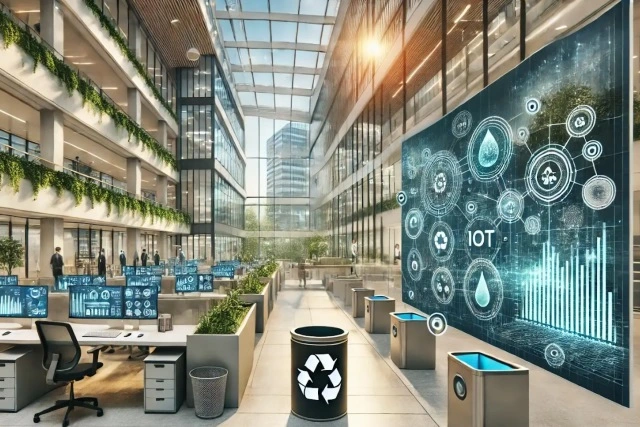What Software is Used in Waste Management?
Commercial waste management software optimizes collection, disposal, and compliance. Leading platforms include IBM TRIRIGA, ENERGY STAR PortfolioManager, Planon, and ProptechOS is an enabler for real estate digitalization through its vast app ecosystem, helping CRE businesses collect, analyze, and act on real-time waste data. By integrating with property infrastructure and IoT sensors, it transforms waste management from a reactive process into a proactive, data-driven strategy that supports regulatory compliance and sustainability goals.
Why is Waste Management Important in Commercial Real Estate?
Every old computer, printer, or outdated server has to be recycled, and old furniture must be disposed of during refurbishment, or when a space acquires a new tenant. According to Green Standards, the average office cubicle will produce between 135 and 315 kilograms of waste — all of which a CRE organization will be responsible for as part of its Scope 3 emissions.
Digital waste management solutions in CRE improve regulatory compliance, reduce operational costs, and enhance sustainability initiatives. It is also critical for achieving certifications like LEED and adhering to laws like the EU Waste Framework Directive and the U.S. Resource Conservation and Recovery Act (RCRA).
Types of Waste Management in CRE
CRE businesses handle various waste streams, including:
- Municipal solid waste (MSW): Everyday trash and recycling from offices.
- Electronic waste (e-waste): Old computers, servers, and electronics.
- Construction and demolition debris: Waste generated during renovations.
- Hazardous waste: Materials requiring special handling.
Best Practices for Waste and Water Management in CRE
To optimize waste disposal and reduce environmental impact, CRE managers should:
- Conduct waste audits to analyze waste streams and identify reduction opportunities.
- Implement the 5 R’s: Refuse, Reduce, Reuse, Repurpose, Recycle.
- Use digital tracking tools to monitor and improve waste management processes.
- Educate tenants and staff about sustainable waste disposal methods.
How Can Software Improve Waste Management?
Advanced waste management software streamlines operations through:
- Automated tracking: Monitors waste disposal and recycling efforts in real time.
- Regulatory compliance: Ensures adherence to environmental standards.
- Optimization tools: Reduces costs by improving collection routes and tracking efficiency.
Regulations Governing Waste Management
U.S. – Resource Conservation and Recovery Act (RCRA)
CRE businesses must comply with the RCRA, which governs waste disposal and mandates environmental due diligence when acquiring properties. Safe disposal of hazardous materials, such as asbestos, is a key responsibility.
EU – Waste Framework Directive (WFD)
The WFD sets baseline waste management regulations across Europe, requiring businesses to minimize waste, comply with recycling quotas, and implement sustainable resource usage strategies.
The ProptechOS App Ecosystem for Waste Management
ProptechOS provides an advanced app ecosystem that enhances waste management, streamlines ESG compliance, and optimizes operations through digital transformation. The key applications include: ProptechOS’s app ecosystem supports waste management by providing specialized tools that connect seamlessly with CRE operations:
- DataDash: A real-time analytics dashboard that visualizes waste production, categorizes waste streams (paper, plastic, organics, etc.), and tracks recycling rates. It provides facility managers with actionable data to improve efficiency, reduce waste, and support sustainability targets.
- Certify: An ESG compliance tool that automatically integrates waste tracking data to support GRESB certification. By linking real-time data to sustainability benchmarks, it simplifies the process of proving environmental performance and regulatory adherence.
- IoT Integration: ProptechOS connects with IoT sensors embedded in waste bins and collection points, offering automated tracking of waste levels, optimizing pick-up schedules, and reducing unnecessary waste collection costs.
- AI-Driven Insights: ProptechOS uses machine learning to forecast waste generation trends, detect inefficiencies, and suggest actionable steps to optimize waste management. This predictive approach helps businesses reduce waste output and improve long-term sustainability.
How ProptechOS Streamlines Waste Management
As regulations tighten, CRE managers must demonstrate compliance and lower Scope 3 emissions. ProptechOS empowers businesses to:
- Automate waste tracking through real-time data monitoring.
- Gain full visibility with DataDash, tracking waste production, categorization, and recycling rates.
- Use Certify to streamline GRESB certification, ensuring compliance with global sustainability benchmarks.
- Optimize waste logistics through AI-driven insights and IoT-connected solutions.
Enhance Waste Management with ProptechOS
Take control of your waste management strategy with ProptechOS. Gain real-time insights, automate compliance, and optimize operations effortlessly. Sign up for a free trial today.
IBM TRIRIGA, ENERGY STAR PortfolioManager, Planon, Archibus by Eptura, and ProptechOS are top platforms for waste tracking and sustainability compliance.
The four main types are landfill disposal, recycling, composting, and incineration.
Rubicon provides digital solutions for waste management and recycling optimization.
ERP (Enterprise Resource Planning) in waste management integrates collection, billing, and compliance in a unified system.
